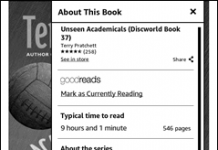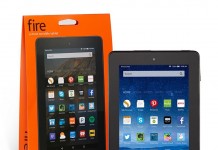![]() Editor’s Note: The following is excerpted from Stephen Windwalker’s Kindle Nation Daily. For the full text go here. PB
Editor’s Note: The following is excerpted from Stephen Windwalker’s Kindle Nation Daily. For the full text go here. PB
… It is stunning news that the Nook outsold the Kindle in March, after a November-December Nook roll-out that was the second coming of the Ford Edsel. Only one problem: it didn’t happen. The report on which these Nook-beats-Kindle stories are based is a report from PVI, the Taiwan-based company that provides e-ink displays for both devices. PVI said that it had shipped more manufacturing units of the Nook than of the Kindle to the U.S. in March. Well, that would be necessary if Barnes & Noble were going to finally begin providing ample Nook inventory in the thousands of retail outlets where it has the capacity to sell the Nook. Given the fact that Barnes & Noble has just completed what sounds like a promising Nook feature upgrade, that inventory boost is significant and, not to be a cynic here, but the company could even have primed the numbers and the media pump a bit with the PVI story in order to cash in on some of that Kindle-Killer Koverage. It won’t suprise me at all if there are more ebooks sold by the Barnes & Noble eReader store and app this year than by Apple’s iBooks store (you can’t sell what you don’t stock), or if Amazon moves quickly to make the Kindle ePub-compatible so that it can read ebooks sold by B&N and others. But let’s not confuse inventory with sales. Sales put cash in a company’s pockets, inventory draws cash down.
… I know of smart people who listened to Amazon’s earnings conference call and concluded that Amazon’s executives did not say anything new or interesting about the Kindle. I suppose you could see it that way, but I’ve been listening to Amazon conference calls for a decade and I heard some very telling statements and shifts of emphasis that suggested, to me, a company that is very confident about several things:
* There are major advances coming soon in explosive growth of the Kindle catalog, including a wider and wider portal for authors to march through either directly or under the auspices of companies like Open Road and RosettaBooks.
* The stunning success of the iPad, iPhone, and iPod Touch, combined with the poverty of the iBooks catalog, will drive continued explosive growth in the number of people who navigate to Amazon’s website to buy Kindle books, other books, and just about every other street-legal product imaginable.
* Phases I, II, and III of the Kindle Revolution are over, and Amazon and the Kindle have won each phase. The goal of Phase I was to move ebook reading from an off-the-radar activity to something that a significant percentage of the world population wants to do. Check. The goals of Phase II were to make the Kindle store and reading environment dominant so as to position Amazon as a kind of market maker in all ebook matters, and Amazon has succeeded beyond its own wildest dreams with more than a 60% share of ebook device sales and a market share of ebook content that reached somewhere between 80 and 95 percent by late last year. Check. The goals of Phase III were to achieve sufficient success and buzz to lure other bigfoot players to the tablet and ebook reader device market — even those who might have opined not so long ago that “nobody reads any more” — so that they would take up some of Amazon’s burden with respect to device manufacturing, inventory, and sales, and leave Amazon, even while it continues to ship a few million Kindle devices each year, to focus on making sure that all of its competitors’ devices would be Kindle-compatible to allow Amazon to market its world-leading ebook catalog to, in time, everyone in the world. Check.

































Phase I and II, yeah.
Phase III, not even close. Amazon has not permitted any other e-reader maker to provide the ability to read Kindle e-books. Amazon/Kindle remains an isolated island where Kindle owners can’t buy DRMed e-books from anyone but Amazon, and Kindle e-books can’t be read on anything but a Kindle (or a Kindle app).
Nor have I seen any sign that Amazon is working with any other device makers to permit them to make devices that can read Kindle e-books.
Can you read Kindle e-books on your iPad? Yes. Can you read Kindle e-books on your Mac? Yes. Can you read Kindle e-books on your i-Phone and iPod Touch? Yes. Can you read Kindle e-books on your PC? Yes. Can you read Kindle e-books on your Blackberry? Yes. Will there be more? No doubt. Brilliant strategy. Who else has done that?
I’d like to see Amazon make ePub books readable on Kindles and Kindle apps, too, but, meanwhile, they surely have been industrious in making it possible to read Kindle e-books on a boatload of other devices. I wouldn’t be surprised to see Amazon add the ePub format in the next year. It seems like a logical next-ish step.
I saw the Nook at my local B&N and I wasn’t too impressed. The touch screen is limited to the very bottom. Having played with it and the Kindle, the Kindle is the better reader right now. The iPad, however, looks really awesome – assuming you’re willing to pay for it.
I doubt we will see ePub support any time soon. Amazon has no need to do this if the market share is really that high. Doing so they would loose in selling eBooks as customers suddenly start to buy at eg B&N instead from Amazon. They act in the same clever way as as Apple, bind the hardware to the shop like the iPod (I know you can buy mp3 from various places, but customers like it convenient and easy).
Project Gutenberg offers the books in mobipocket, pdf can be converted, etc.
As much as I would like to have a wireless reader I have chosen a Sony for the DRM ePub support instead of a Kindle. Living in Europe with the sole ePub support left no other choice. If Amazon would support DRM ePub on his Kindle, I would probably exchange without a blink my reader, but I have no hopes for it.
Thanks for the comments, @Doug and @Kate.
@Doug, you’re certainly correct about DRMed ebooks from other sources, and Amazon’s business agenda is probably not to open that particular door unless and until it feels it has established a certain level of market hegemony. That may not be too far off, and may be hastened if Amazon judges that the Nook is making an impressive recovery, something that now looks like a real possibility. I’m with @Kate in anticipating more openness to ePub books relatively soon.
But I’m a bit mystified trying to figure out what you mean when you say that “Kindle e-books can’t be read on anything but a Kindle (or a Kindle app).” Just so, and there are now free Kindle apps for PC, Mac, BlackBerry, iPad, iPhone, and iPod Touch with more promised. That’s not everyone in the world, but it’s on the path, no?
Of course my point about Phase III was that Amazon wanted to lure other bigfoot device makers into the party, and it does seem clear that it’s done that without necessarily issuing a written invitation. Apple’s in, and it’s heavily rumored that something more along the lines of written invitations *have* been issued for forthcoming products from Dell and Microsoft. I’m no fan of either, but I’ll grant that they qualify for the “bigfoot” moniker. I’ll be fascinated personally to see what develops further along these lines, e.g., with Google and various other tablets and Android phones.
@Roberto, I’m more optimistic than you about ePub support, and part of Amazon’s motivation will be sentiments like yours. Amazon’s not likely to write you off because you are in Europe; even though the Kindle is just beginning to scrape the international ebook surface, the corporate vision for the device is very much international, and the extent to which the company’s overall footprint has become international is well illustrated by the fact that $3.35 billion of its $7.13 billion in 1st Q revenue came from outside the US.
Meanwhile, I suspect Amazon is watching the resurgence of the Nook very closely, and may find further impetus toward ePub there.
@Windwalker: Your words were “making sure that all of its competitors’ devices would be Kindle-compatible” (emphasis added).
Amazon is clearly not making sure that all of its competitors’ devices are Kindle-compatible. In fact, the only Kindle-compatible e-readers come from Amazon, and I haven’t heard of any in the works from anyone else.
The people who buy Kindles do so because they prefer a dedicated e-reader over a programmable device for reading e-books. Enough so that they’re willing to spend a big chunk of change for their Kindles. If they wanted to read e-books on an iPhone, they wouldn’t have bought Kindles.
Amazon is continuing its policy of locking in those Kindle customers. If you buy a Kindle, you only have one source of DRMed e-books: Amazon. And the more Kindle e-books you buy, the more likely that you’ll never be able to switch to another dedicated e-reader, no matter how badly Amazon might treat you in the future, because you’d have to scrap your entire e-book collection.
Similarly, if you buy an iPad and buy your e-books from Amazon—a reasonable thing to do if you’re reading e-books on an iPad—and then decide that you want a dedicated e-reader, you’ve only got one choice: Kindle. Amazon pwns you.
Barnes & Noble opened its format up to everybody else by having it included in Adobe Reader Mobile. When Amazon does the same for its Kindle format, then I’ll believe that there is a Phase III where Amazon is more concerned with selling e-books than with locking in customers.
Amazon sure doesn’t want to sell their e-books to me, even though I’m an Amazon Prime customer. They won’t let their e-books be readable on my Nook. In fact, Amazon is about the only place I can’t buy e-books from.
You’re absolutely right, Doug. Amazon certainly wants to position all of this so that your likeliest “choices” involve its hardware, its apps, or its content, or, as you put it, so that it “owns” you. Nothing I have written about Amazon or the Kindle has been intended to describe the company as altruistic. They are in business to make a profit, as unlikely as that seemed to many a decade ago ;-). I do happen to think that they often perceive the road to profit as involving a “big tent” approach in which they lure competitors in as, at some level, partners. But they always pay attention to making sure that the opening of that tent is on their terms.
Good luck with that Nook!